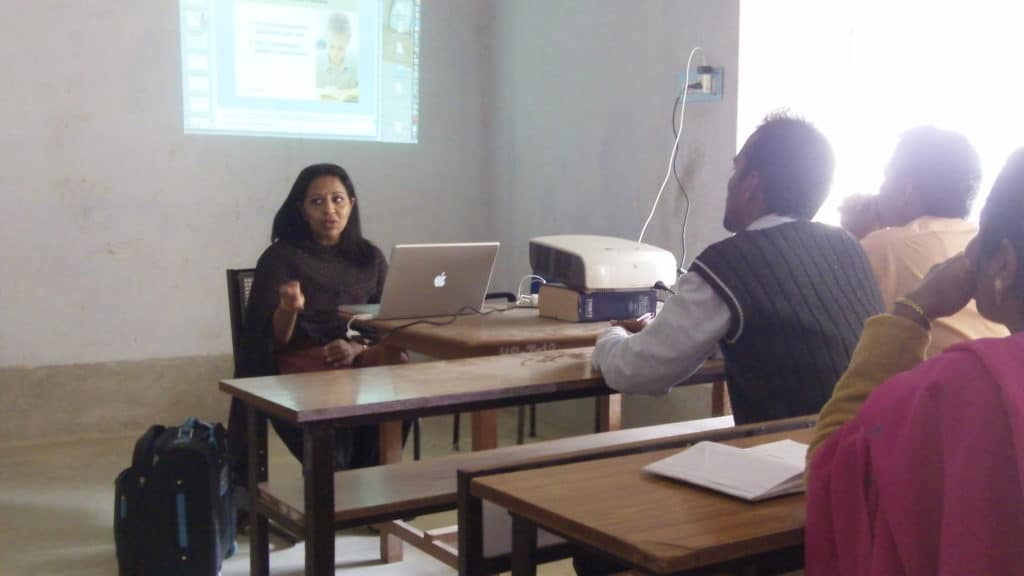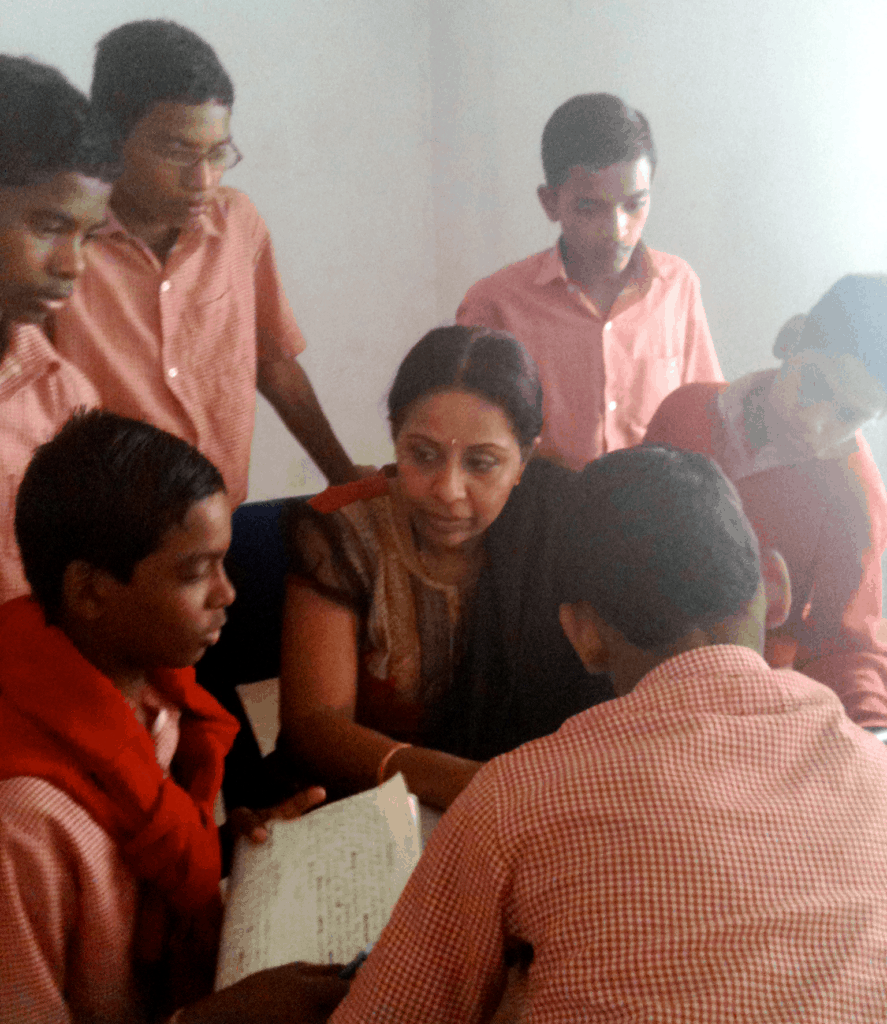
Jyothi Bathina
A five day Literacy Institute was held for the teachers of Balashram by Dr. Jyothi Bathina from Jan 11-15, 2011. This was a follow up Institute to one she conducted at the Balashram two years ago. She also worked with the students to encourage student voices.
Dr. Bathina also spent several hours with the upper class children each day teaching them literacy devices. Using personal narrative as a tool, she engaged them in the writing process to think deeply about their own lives and circumstances and finding their place in the larger world.
The principal and all teaching staff attended the sessions with great enthusiasm and interacted well for learning the skills. The seminar was very educative and helpful to the teachers and the taught. The Principal appreciated the program and thanked Dr. Bathina expressing interest in having more and more of such seminars.
Dr. Bathina is a professor of literacy in the Literacy and Early Education Department of the Kremen School of Education at California State University, Fresno. She trains teacher candidates on how to effectively build content and critical literacy among students. She is the founder and director of Literate Voices, a foundation that seeks to build literacy among underprivileged populations. She works with schools and community organizations to publish student voices and has published several student anthologies. See https://literatevoices.com for more information.

I’m sitting in Bhubaneshwar airport on my way back to Hyderabad from a five-day journey to Orissa. I’ve spent the last few days doing what I love best, working with children, encouraging them to voice their stories and loving them and receiving their love.
“It never ceases to amaze me how quickly we can bond with others, of any age, once we open up to them and allow them to open up to us.”
This process cuts across cultures, countries, belief systems and traditions. It cuts across race, religion, caste, and creed and allows us to embrace each other as human beings with warm vibrant souls.
As usual, when my mother and I first arrive in Bhubaneshwar after traveling from the city and all its comforts to the village of Arua, I suffer from culture shock. Even as I appreciate the lush green paddies, the doe eyed calves and the picturesque huts along the way, I dread the lack of creature comforts, the internet, soft beds, warm rugs, clean, dry bathrooms with running hot water. The minute we set foot in the ashram I have been longing to visit, I begin to cringe, anticipating the frogs at night, the field mice that scurry past in the dark, the spiders and ants, the feeling of displacement and discomfort that is inevitable when I travel to less “civilized” parts of the world.
Our first night is cold, and I struggle to keep warm under the thin covering, my teeth chattering from the unusual temperatures. After a difficult night we wake early at 5 a.m. the sounds of the children floating down to our room from their dorms upstairs. Once we get dressed and make our way to the school, I see the children. School starts at 7 a.m. and the children must line up by 6:30 for their morning assembly. Just seeing them in their bright red sweaters and warm red hoods makes me happy and I begin to remember the reason for my visit. I have made it through the first night and now that the children are lined up before my eyes, I don’t feel quite so bad anymore.
“What’s a frog or two, or a cold night when I can enjoy the company and the laughter and the bright beautiful faces of these young hopeful spirits.”
Many of them recognize my mother as Sudha Ma, who happened to serve as their principal a couple of years ago. Some of them recognize me from my previous visit, though they were just third-graders at the time. They approach me, smiling shyly and saying my name, “Jyothi Ma’am.”
At 7 a.m. I enter the first period of the day. It is English class for the 5th graders and the teacher has kindly agreed to let me teach her class today. I introduce myself, explaining to them what a professor does and why I am there. I show them the other literate voices, anthologies, and explain that I want to help them write their own book if they are interested. They are jubilant at the thought and respond enthusiastically that yes, they do want to write their own book. Thrilled, I read them some chapters from “Beyond the Fields.” I ask them to write their name chapter and to compare their names to music, to color, to numbers, to moods. We begin.

Each day I spend several hours with the children. We meet in the morning at first period and I teach them literary devices. We write descriptions of each other and of their scariest monster. They draw and describe their drawings, using color and detail. I discuss the five senses and painting pictures with words and they respond with amazing descriptions of the Bhuvaneshwar bazaar and the Jagannath Temple. In the afternoons, I coach the teachers, training them on literacy methods and content area reading. In the evenings, I go back to work with the students during their coaching sessions, which run from 6 to 8 p.m. We work on the chapters, introducing name, family, friends, neighborhood and dreams. The children struggle at first with the concept of family, since many of them are orphans and some are from broken homes. All of them have left their families but they eagerly retrieve submerged memories and begin to describe their lost mothers, absent fathers and the scenic villages they have left behind. They describe the new family they have found in their beloved baba and the loving brahmacharinis and teachers who have comforted them, loved them and guided them in their education.
Each and every one of them is incredibly grateful for the opportunity they have been given to fulfill their potential as human beings. As I listen to them talk eagerly about their dreams, each hope for a good education and a meaningful job intertwined with the larger goals of helping those less fortunate, I sit back in awe at their resilience and their generous nature.
Coming from California, where we struggle daily with the task of motivating impoverished students to come to school and learn, I wonder what makes these children react in such a positive way to hardship. What motivates them not only to study hard but to work towards helping others? What can I take from this that will help me train teachers to better serve their students? What is the magic formula? I can only believe that these children are being raised and educated in an environment that fosters such an outlook. If this is the atmosphere and these are the noble young citizens of the future that the school is preparing, then Hariharananda Balashram is truly fulfilling its purpose. Isn’t this what education should be about? Not merely content knowledge but the inculcating of human values, the preparation for the real world and the ability to not only navigate the world but to contribute meaningfully toward its betterment?
The teachers I came here to train have taught me the power of patience, resolve and a willingness to take on the role not only of teacher, but nursemaid, mother, father, guide and mentor. They are in class by 7 a.m. and teach until 8 p.m. in the evening with a short break for lunch. They handle their own families and households and pour every ounce of energy into the hundreds of children they have adopted as their own.
“And then there are the children. The children are my heroes.”
They come from hard pasts and unutterable poverty. They live without parents or siblings, far from family and familiar village homes. Yet their smiling shining faces and bright eyes are a testament to their indomitable spirits and their hope and courage in the face of adversity and challenge. They are loved and it shows. They are grateful, happy and eager to share their good fortune by growing up and saving the world. This is what I call true heroism.
So as I leave Orissa, I am also full of gratitude. I am grateful for the opportunity to witness this quiet miracle, taking place in the tiny village of Arua. I am grateful that baba has allowed me to contribute in some small way to such a noble endeavor. I am grateful for this experience which has reminded me that that there are much bigger challenges and much nobler goals to be met than always being comfortable. And most of all, I am grateful for the children, for reminding me that education is a gift not only to be treasured but to be used in the service of humanity and thereby God.
